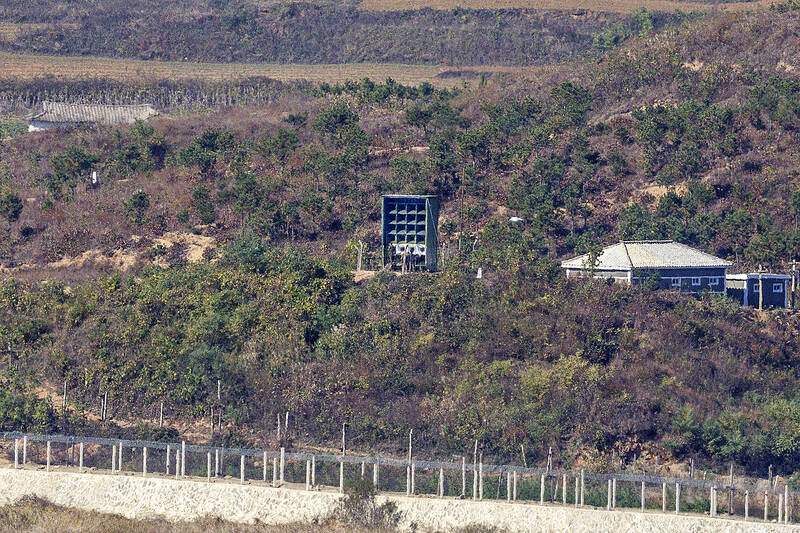South Korea’s military said North Korea disrupted GPS signals from border areas for the second straight day yesterday, affecting an unspecified number of flights and vessel operations.
Tensions between the rival Koreas have escalated as North Korean leader Kim Jong-un flaunts his advancing nuclear and missile program, and engages in electronic and psychological warfare, such as flying thousands of balloons to drop trash and anti-South Korean propaganda leaflets in the South.
The South Korean Joint Chiefs of Staff said North Korean operations to manipulate GPS signals were detected from around the North Korean western border city of Kaesong and the nearby city of Haeju on Friday and yesterday, and said the activities disrupted dozens of civilian aircraft and several vessels.

Photo: EPA-EFE
While warning aircraft and vessels near western border areas, South Korea’s military did not specify how North Korea was interfering with GPS signals or detail the extent of disruptions.
“We urge North Korea to stop GPS interference provocations immediately and strongly warn that it will be held fully accountable for any resulting consequences,” the South’s joint chiefs said in a statement.
North Korea’s GPS signal disruptions and balloon campaigns highlight the vulnerability of South Korea’s Incheon International Airport, its main transportation gateway, analyst Yoon Suk-joon recently wrote on the North Korea-focused 38 North Web site.
The airport, which carries 56 million people and 3.6 million tonnes of cargo annually, is less than 100km from North Korea.
“No major aviation incidents have resulted to date, but GPS interference can endanger commercial airlines flying in poor visibility, and it is a violation of international conventions on navigational safety,” Yoon wrote.
He said that this year North Korean trash balloons halted the airport’s runway operations 12 different times for a total of 265 minutes.
Kim has shown more hostility this year toward Seoul’s conservative government — which maintains a hard line on Pyongyang — with the North abandoning its long-standing goal of reconciliation with its war-divided rival and rewriting its constitution to cement South Korea as a permanent adversary.
North Korea also blew up sections of its unused road and rail routes linked with the South last month in a symbolic display of anger toward Seoul, and this month opened with a flight-test of a new intercontinental ballistic missile to dial up pressure on Washington.

A magnitude 7.0 earthquake struck off Yilan at 11:05pm yesterday, the Central Weather Administration (CWA) said. The epicenter was located at sea, about 32.3km east of Yilan County Hall, at a depth of 72.8km, CWA data showed There were no immediate reports of damage. The intensity of the quake, which gauges the actual effect of a seismic event, measured 4 in Yilan County area on Taiwan’s seven-tier intensity scale, the data showed. It measured 4 in other parts of eastern, northern and central Taiwan as well as Tainan, and 3 in Kaohsiung and Pingtung County, and 2 in Lienchiang and Penghu counties and 1

FOREIGN INTERFERENCE: Beijing would likely intensify public opinion warfare in next year’s local elections to prevent Lai from getting re-elected, the ‘Yomiuri Shimbun’ said Internal documents from a Chinese artificial intelligence (AI) company indicated that China has been using the technology to intervene in foreign elections, including propaganda targeting Taiwan’s local elections next year and presidential elections in 2028, a Japanese newspaper reported yesterday. The Institute of National Security of Vanderbilt University obtained nearly 400 pages of documents from GoLaxy, a company with ties to the Chinese government, and found evidence that it had apparently deployed sophisticated, AI-driven propaganda campaigns in Hong Kong and Taiwan to shape public opinion, the Yomiuri Shimbun reported. GoLaxy provides insights, situation analysis and public opinion-shaping technology by conducting network surveillance

‘POLITICAL GAME’: DPP lawmakers said the motion would not meet the legislative threshold needed, and accused the KMT and the TPP of trivializing the Constitution The Legislative Yuan yesterday approved a motion to initiate impeachment proceedings against President William Lai (賴清德), saying he had undermined Taiwan’s constitutional order and democracy. The motion was approved 61-50 by lawmakers from the main opposition Chinese Nationalist Party (KMT) and the smaller Taiwan People’s Party (TPP), who together hold a legislative majority. Under the motion, a roll call vote for impeachment would be held on May 19 next year, after various hearings are held and Lai is given the chance to defend himself. The move came after Lai on Monday last week did not promulgate an amendment passed by the legislature that

AFTERMATH: The Taipei City Government said it received 39 minor incident reports including gas leaks, water leaks and outages, and a damaged traffic signal A magnitude 7.0 earthquake struck off Taiwan’s northeastern coast late on Saturday, producing only two major aftershocks as of yesterday noon, the Central Weather Administration (CWA) said. The limited aftershocks contrast with last year’s major earthquake in Hualien County, as Saturday’s earthquake occurred at a greater depth in a subduction zone. Saturday’s earthquake struck at 11:05pm, with its hypocenter about 32.3km east of Yilan County Hall, at a depth of 72.8km. Shaking was felt in 17 administrative regions north of Tainan and in eastern Taiwan, reaching intensity level 4 on Taiwan’s seven-tier seismic scale, the CWA said. In Hualien, the